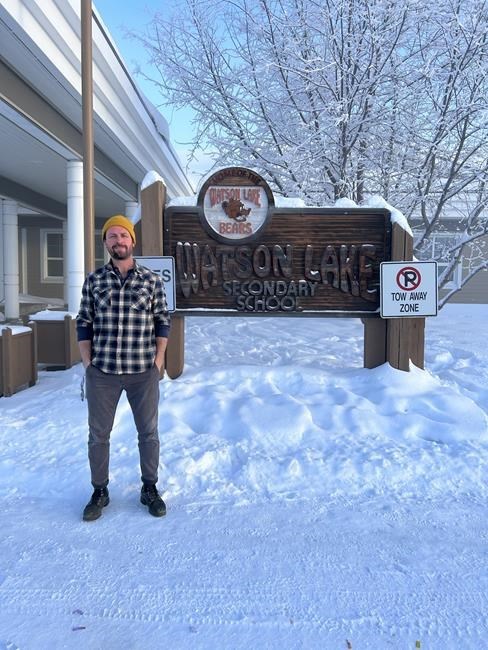VANCOUVER — Ski resorts are closed because of extreme cold, teachers are impressing students by instantly freezing boiling water, and it's even too cold for a zoo penguin walk.
Extreme cold has moved over Western Canada from the Arctic, bringing wind chill values approaching -50 to some areas, surprising even residents who know how to deal with cold winters.
Ben DeKleine, owner of Magel's Cafe in Prince George, B.C., said freezing temperatures there have put his truck, which is usually ready for Canadian winters, out of commission.
"You called me as I'm looking through my F-150's owner's manual, because my truck won't start this morning because it didn't appreciate the cold snap," said DeKleine, who has lived in Prince George for more than a decade.
"I didn't have it plugged in because it just hasn't been cold enough, and now it won't start," he said. "I think it blew a fuse."
Environment Canada said temperatures in Prince George dipped to -29 C Thursday and may drop to as low as -36 C Friday just a week after hovering around the freezing mark.
The forecaster has posted extreme cold or arctic outflow warnings for parts of Yukon and the Northwest Territories, most of B.C. and Saskatchewan and all of Alberta.
Temperatures in Calgary and Edmonton dipped to -30 C and -31 C respectively Thursday and lows of -38 C are possible there Friday.
The Calgary Zoo said it has cancelled a preview of its outdoor penguin walk due to safety concerns for staff and visitors, and several ski hills have also been disrupted.
Nakiska Ski Area, which is in Kananaskis Country about an hour drive west of Calgary, said on its website that it will be closed Thursday and Friday.
In Banff National Park, where wind chill values were expected to be close to -40, the Banff Sunshine ski resort closed Thursday. Two others, Lake Louise Ski Resort and Mount Norquay, said they are open but operations are reduced.
In Watson Lake, Yukon, where daytime temperatures of -46 C made it the coldest place in Canada on Thursday morning, school principal Ryan Hewgill said he also ran into car trouble.
"I will be honest, my truck did start this morning, but the first time it seemed like it might not,” said Hewgill, principal at Watson Lake Secondary School.
He said other staff members ran into similar issues with their vehicles.
Yukon residents are more acclimated to cold weather than most, and Thursday was mostly another normal school day in Watson Lake, he said.
Teachers especially love the cold weather because it allows for classes to conduct boiling-water experiments, where the water is thrown in the air outside and freezes instantaneously, Hewgill said.
“We acknowledge the cold, but nobody like really focusing on it too much," Hewgill said. "It’s just part of Yukon winter.”
In Manitoba, some areas are expected to receive up to 20 centimetres of snow Thursday, and roughly a dozen rural school divisions closed schools due to extreme weather and hazardous driving conditions
School was also cancelled Thursday in Hope, B.C., due to "whiteout conditions beyond the scales" according to the district.
Environment Canada's warnings extend into the normally temperate Metro Vancouver and Greater Victoria regions.
It said the combination of gusts reaching 60 kilometres an hour and cold temperatures will push wind chill values in Metro Vancouver and Greater Victoria to near -20.
The agency warned that temperatures that cold can bring frostbite, and hypothermia can occur within minutes if precautions are not taken when outdoors.
Meteorologist Armel Castellan said he expects some daily temperature records may be broken on the West Coast, but the more concerning issue is the cold snap coming on the heels of an abnormally warm December.
"The fact of the matter is, people and pets and even the ecology out there haven't had time to adapt to the cold," Castellan said.
"So, there's a really strong case to be made about how cold injuries — frostnip, frostbite, potentially hypothermia and even death — are really front of mind when we think about the public through the next few days."
Castellan said in an interview on Thursday that the cold temperatures are "locked in" for the next three to four days, but the weather models have not been conclusive about what follows.
"They don't all agree on how early next week is going to play out, and so those details are just going to have to come in a little bit later."
B.C.'s Ministry of Emergency Management and Climate Readiness said in a statement that all of the province's extreme-weather response shelters are now open. It said more than 5,500 shelter spaces, including permanent, temporary and extreme-weather shelters, are open.
Back in Prince George, DeKleine said he is just happy he is now running a restaurant instead of working in his previous job as a telecommunications technician.
"I've been at the top of the telephone pole with -25 C," he said. "The hardest part of that job was that you can't do most of what we do with gloves on. You have to take those gloves off, and even for five seconds at a time on a pole, you risk frostbite."
This report by The Canadian Press was first published Jan. 11, 2024
The Canadian Press

